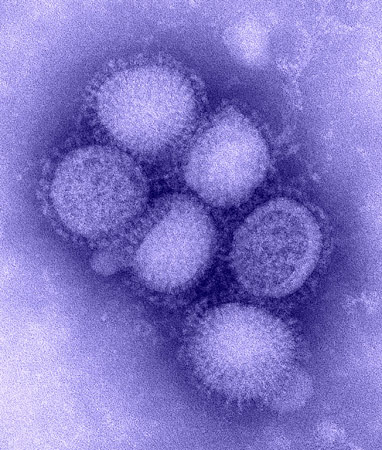H1N1
ZURICH, June 12 (Reuters) - Novartis AG (NOVN.VX)
expects a vaccine for the H1N1 virus, the source of the first flu
pandemic for 40 years, to be available by the autumn after it produced
the first batch for testing ahead of schedule.
The vaccine will
enter clinical trials next month, the Swiss
drugmaker said on Friday,a day after the World Health Organisation
declared a pandemic and warned
governments to prepare for a long battle against the virus.
[ID:nNLB765857]
Novartis, Sanofi-Aventis (SASY.PA), GlaxoSmithKline (GSK.L) and Solvay (SOLB.BR)
all obtained the influenza A (H1N1) seed virus in recent weeks and aim
to have a vaccine ready ahead of the northern hemisphere flu season.
[ID:nLB16505]
The WHO has estimated vaccine makers could
produce up to 4.9 billion pandemic flu shots a year in a best-case
scenario, leaving some of the world's 6.5 billion population
unprotected, particularly if more than one injection was needed to gain
immunity.
Novartis said first results with the H1N1 wild type
strain showed it was quicker to make the vaccine through cell-based
than through egg-based production, and it had completed its first batch
weeks earlier than expected.
Its cell-culture vaccine plant in
Marburg, Germany had the potential to produce millions of doses per
week, but it was difficult to predict output capacity for now.
Spokesman Eric Althoff said Novartis should have the vaccine ready in
September or October. He was unsure if other companies had completed
the first stage of the production process. Glaxo said on Friday it
would be able to meet advance purchase commitments for 150 to 180
million doses, and the 50 million it donated to the WHO for developing
countries. [ID:nLF949487]
"We don't see any upside in this race
to have the first vial off the production line. For us its about
focusing on producing significant volumes of the pandemic vaccine to
ensure that countries and their populations are protected," a Glaxo
spokesman said.
Wayne Pisano, head of vaccines at Sanofi, the
world's largest flu vaccine supplier, said on Thursday his company
would "produce the largest number of doses of vaccine in the shortest
timeframe", though it would be another four months before the first
supply of bulk concentrate was ready.
By 1138 GMT, shares in
Novartis had risen 4 percent to 44.84 Swiss francs, while the European
pharmaceuticals sector was trading 2.3 percent higher .SXDP. Glaxo,
Sanofi and Solvay shares rose between 1.3 and 3.7 percent.
CELL-BASED TECHNOLOGY
The H1N1 strain has spread widely, with 28,774 infections confirmed in
74 countries to date, including 144 deaths, according to the WHO's
latest tally. Although the strain seems mild at present, health
officials are worried it might return in a more virulent form in the
northern hemisphere winter.
While commercial production of
vaccines usually depends on how easily a virus strain grows in chicken
eggs, Novartis said its cell-based technology means it can produce a
vaccine without having to adapt the virus strain to grow in eggs.
| 




